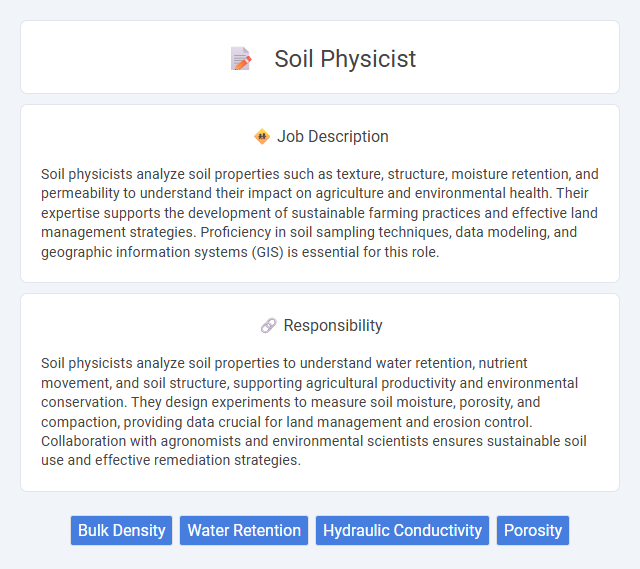
Soil physicists analyze soil properties such as texture, structure, moisture retention, and permeability to understand their impact on agriculture and environmental health. Their expertise supports the development of sustainable farming practices and effective land management strategies. Proficiency in soil sampling techniques, data modeling, and geographic information systems (GIS) is essential for this role.
Individuals with strong analytical skills and a passion for environmental science are likely to thrive as soil physicists, given the job's demand for detailed data analysis and fieldwork. Those who prefer routine tasks or limited outdoor activity might find this role challenging due to its combination of laboratory research and field experiments. Physical stamina and a willingness to adapt to diverse environmental conditions may increase suitability for this profession.
Qualification
Soil physicists typically require a bachelor's degree in soil science, environmental science, or physics, with many roles demanding advanced degrees such as a master's or Ph.D. specializing in soil physics, hydrology, or related fields. Strong knowledge of soil composition, water movement, and soil-plant relationships is essential alongside skills in data analysis, modeling software, and laboratory techniques. Professional experience in field sampling and soil testing, complemented by certifications like Certified Professional Soil Scientist (CPSS), enhances job qualifications and career prospects.
Responsibility
Soil physicists analyze soil properties to understand water retention, nutrient movement, and soil structure, supporting agricultural productivity and environmental conservation. They design experiments to measure soil moisture, porosity, and compaction, providing data crucial for land management and erosion control. Collaboration with agronomists and environmental scientists ensures sustainable soil use and effective remediation strategies.
Benefit
Soil physicists likely enjoy benefits such as opportunities for hands-on research in various environments, which can enhance their practical and analytical skills. There is a probability of contributing to sustainable agricultural practices and environmental conservation, offering a sense of purpose and impact. Competitive salaries and prospects for career advancement may also be common in this field.
Challenge
Soil physicist jobs likely involve addressing complex environmental challenges related to soil health, water retention, and erosion control. The role probably demands a strong grasp of soil properties and the ability to develop sustainable solutions under variable conditions. Problem-solving skills may be crucial for conducting experiments and interpreting data to improve agricultural productivity and land management.
Career Advancement
Soil physicists advance their careers by gaining expertise in soil-water interactions, erosion control, and agricultural productivity through research and fieldwork. Professional growth often involves obtaining advanced degrees such as a master's or Ph.D. in soil science or related fields, leading to roles in academia, environmental consultancy, or government agencies. Specializing in cutting-edge technologies like remote sensing and soil modeling enhances job prospects and leadership opportunities in soil resource management and environmental sustainability.
Key Terms
Bulk Density
Soil physicists analyze bulk density to assess soil compaction, porosity, and water retention capacity, which are critical for crop growth and environmental sustainability. Accurate measurement of bulk density helps predict root penetration, soil aeration, and nutrient availability essential for precision agriculture. Advanced techniques like gamma-ray attenuation and X-ray computed tomography enable precise, non-destructive evaluation of soil bulk density under various field conditions.
Water Retention
Soil physicists specializing in water retention analyze soil properties to understand moisture dynamics and improve irrigation efficiency in agriculture. They use techniques such as pressure plate apparatus and tensiometers to measure soil water holding capacity and retention curves. Their expertise supports sustainable water management practices and enhances crop yield by optimizing soil moisture availability.
Hydraulic Conductivity
A Soil Physicist specializing in Hydraulic Conductivity studies the rate at which water moves through soil pores, a critical factor for irrigation management, groundwater recharge, and contaminant transport. Expertise in measuring soil permeability, porosity, and saturation levels allows for accurate modeling of water flow in various soil types. Advanced knowledge of soil texture, structure, and compaction informs assessments that improve land use planning and environmental protection strategies.
Porosity
Soil physicists analyze porosity to understand soil structure and its ability to retain water and nutrients, crucial for agriculture and environmental management. By measuring pore size distribution and volume, they assess soil aeration and permeability, impacting plant growth and microbial activity. Advanced techniques like X-ray computed tomography enable precise porosity characterization, supporting soil conservation and sustainable land use.
 kuljobs.com
kuljobs.com